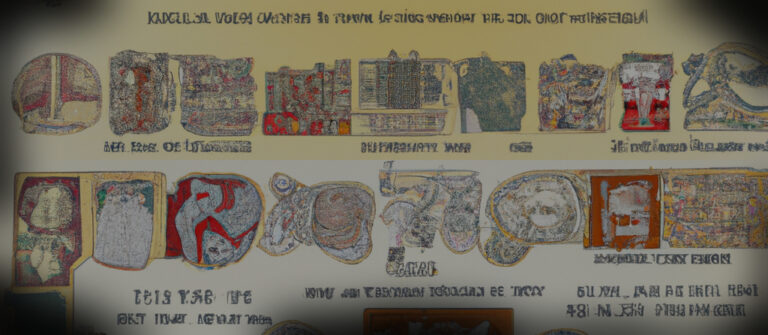This timeline enables me to write with an appropriate degree of precision while accurately reflecting the quality of the available data. I use a tilde (~) to indicate uncertainty in a date, which prompts me to use terms like “about” or “estimated.” When there is no tilde, I simply use the date as given. Additionally, I include date ranges in parentheses to represent the best estimates accepted by scholars. Lastly, I use an asterisk (*) in front of a place name to denote uncertainty, which encourages me to use terms like “likely” or “possibly.”
Consider these three examples:
- ~700 BCE: Gargi Vachaknavi, ~700 BCE (800 BCE-600 BCE), India, (unknown age).
- ~535 to ~475 BCE: Worldview, Heraclitus, ~535 BCE in Ephesus to ~475 BCE, *Ephesus,
- ~60 (60-61). 551 to 479 BCE: Confucianism, Confucius, 551 BCE in Qufu to 479 BCE in Qufu, age 72.
These examples allow me to quickly craft sentences like the following:
- Gargi lived in India around 700 BCE, give or take a century, but we do not know her lifespan.
- Heraclitus was born approximately 535 BCE in Ephesus and lived to be around 60 or 61 years old. He died about 475 BCE and is thought to have likely passed away in Ephesus as well.
- Confucius was born in 551 BCE and died at the age of 72 in 479 BCE.
Regarding this last “confident” example of Confucius. Although we cannot be entirely certain about Confucius’s birth and death dates, they are so widely accepted that I feel confident using them without explicitly acknowledging any doubt. That’s the type of benefit I get from this list; I get productivity.
- ~700 BCE: Gargi Vachaknavi, ~700 BCE (800 BCE-600 BCE), *India, (unknown age).
- ~624 to ~546 BCE: Naturalism, Thales of Miletus, ~624 BCE in *Miletus to ~546 BCE, ~age 78.
- ~604 to ~517 BCE: Daoism, Laozi, ~6th century BCE, China, ~age 87 (80-100+).
- ~600 BCE: Indian Samkhya, Kapila, lived around this time, India, (unknown age).
- ~600 BCE Indian Lokayata, Brihaspati, lived around this time, *India, (unknown age)
- 599 to 527 BCE: Indian Jainism, Mahavira, 599 BCE in *Vaishali to 527 BCE, age 72.
- 563 to 483 BCE: Buddhism, Siddhartha Gautama, 563 BCE in Lumbini to 483 BCE in Kushinagar, age 80.
- 551 to 479 BCE: Confucianism, Confucius, 551 BCE in Qufu to 479 BCE in Qufu, age 72.
- ~535 to ~475 BCE: Worldview, Heraclitus, ~535 BCE in Ephesus to ~475 BCE, *Ephesus, ~60 (60-61).
- ~500 BCE: Indian Mimamsa, Jaimini, ~500 BCE, India, (unknown age).
- ~500 BCE: Indian Ajñana, Sanjaya Belatthiputta, lived around this time, India, (unknown age).
- ~428 to ~347 BCE: Rationalism, Plato, 428-7 BCE in Athens to 348-7 BCE in Athens, ~age 80 (80-81).
- ~470 to ~391 BCE: Mohism, Mozi, ~470 BCE to ~391 BCE, *China, ~age 79
- ~404 BCE to ~323 BCE: Cynic anti-materialism, Diogenes of Sinope, ~404 BCE to ~323 BCE, ~age 81.
- 384 to 322 BCE: Empiricism, Aristotle, 384 BCE in Stageira to 322 BCE in Chalcis, ~age 62.
- ~360 to ~270 BCE: Skepticism, Pyrrho of Elis, ~360 BCE in Elis to ~270 BCE in Elis, ~age 90 (85-97).
- 341 to 270 BCE: Epicurean hedonism, Epicurus, 341 BCE in Samos to 270 BCE in Athens, age 71.
- ~334 to ~262 BCE: Stoicism, Zeno of Citium, ~334 BCE in Citium to ~262 BCE *Athens, ~age 72.
- 341 to 270 BCE: Epicureanism, Epicurus, 341 BCE in Samos to 270 BCE in Athens, age 71.
- ~280 to ~233 BCE: Legalism, Han Fei, ~280 BCE to ~233 BCE, China, ~age 47.
- ~200 to ~100 BCE: Indian Nyaya, Gautama, lived during this time, India, (unknown age)
- ~200 to ~100 BCE: Indian Vaisheshika, Kanada, lived during this time, India, (unknown age)
- ~150 BCE to ~150 CE: Indian Yoga, Patanjali, lived during this time, India, (unknown age).
- ~20 BCE to ~55 CE: Jewish philosophy, Philo of Alexandria, ~20 BCE to ~55 CE, ~age 75.
- 121 to 180 CE: Stoicism, Marcus Aurelius, 26 Apr 121 CE in Rome to 17 Mar 180 CE in Vindobona, age 58.
- ~204 to ~270 CE: Neoplatonism, Plotinus, ~204 CE to ~270 CE, ~age 66.
- ~801 CE to ~873 CE: Islamic Kalam, Al-Kindi, ~801 CE to ~873 CE, ~age 72.
- ~1058 CE to ~1111 CE: Islamic Sufism, Al-Ghazali, ~1058 CE to ~1111 CE, ~age 53.
- ~700 CE to ~748 CE: Islamic Mu’tazila, Wasil ibn Ata, ~700 CE to ~748 CE, ~age 48.
- ~980 to ~1037: Islamic Avicennism, Avicenna, ~980 to ~1037 CE, ~age 57.
- ~1126 to ~1198: Islamic Averroism, Averroes, ~1126 to ~1198, ~age 72.
- ~1225 to ~1274: Scholasticism, Thomas Aquinas, ~1225 to ~1274, ~age 49.
- ~1466 to ~1536: Humanism, Desiderius Erasmus, ~1466 to ~1536, ~age 70.
- 1596 to 1650: Cartesian Dualism, René Descartes, 1596 to 1650, age 54.
- 1632 to 1704: Empiricism, John Locke, 1632 to 1704, age 72.
- 1748 to 1832: Utilitarianism, Jeremy Bentham, 1748 to 1832, age 84.
- 1712 to 1778: Romanticism, Jean-Jacques Rousseau, 1712 to 1778, age 66.
- 1803 to 1882: Transcendentalism, Ralph Waldo Emerson, 1803 to 1882, age 79.
- 1905 to 1980: Existentialism, Jean-Paul Sartre, 1905 to 1980, age 74.
- 1859 to 1938: Phenomenology, Edmund Husserl, 1859 to 1938, age 79.
- 1889 to 1951: Logical positivism, Ludwig Wittgenstein, 1889 to 1951, age 62.
- 1839 to 1914: Pragmatism, Charles Sanders Peirce, 1839 to 1914, age 74.
- 1857 to 1913: Structuralism, Ferdinand de Saussure, 1857 to 1913, age 56.
- 1926 to 1984: Post-structuralism, Michel Foucault, 1926 to 1984, age 57.
- 1930 to 2004: Deconstructionism, Jacques Derrida, 1930 to 2004, age 74.
- 1895 to 1973: Critical theory, Max Horkheimer, 1895 to 1973, age 78.









